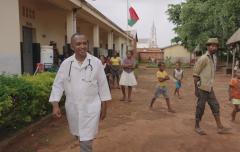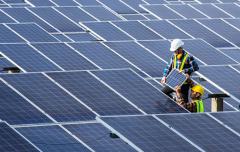Editor's pick: Powering local Sudanese hospital with solar energy to boost maternal health care
This article was first published on ReliefWeb
After traveling tens of to give birth, electricity cuts delayed Aisha’s C-section operation and further put her newborn baby at risk without a fully operational incubator.
Rural health clinics and hospitals across Sudan are heavily affected by frequent and lengthy power cuts. Temporary solutions such as back-up generators and batteries have proven to be neither efficient nor affordable, and costs end up on the patient’s hospital bill.
UNFPA piloted a renewable energy project in Abu Jebiha, South Kordofan by partnering with Global Aid Hand to install a solar power system in Abu Jebiha Hospital. On 31 December 2021, all hospital facilities began operating with 24/7 renewably-powered electricity, including the maternity ward, operation rooms, blood bank refrigerators, incubators, medicine storage rooms and administration offices.
Looking forward, UNFPA aims to garner more funding support in order to replicate the successful case of Abu Jebiha Hospital and to power hospitals and health clinics in underserved locations across Sudan with solar energy which will also serve in the fight against climate change in Sudan.
“Our mission is to strengthen the health system in Sudan with sustainable tools to better serve the women and girls in every locality in the country. This successful project will be expanded to cover more health facilities during 2022 with the support of our donors,” Mr. Mohamed Lemine, UNFPA Representative in Sudan.
Abu Jebiha Hospital, established in 1957, is the third largest hospital in the state of South Kordofan and has maternal health care facilities to manage both normal deliveries and C-sections. It serves the 900,000 people living in Abu Jebiha locality, among whom are refugees from South Sudan, and receives additional referrals from six neighboring localities.
Due to the general lack of electricity in the area, the hospital’s capacity was previously severely restricted as it had been relying on generators that only worked for 2-3 hours a day. Moreover, patients seeking to undergo a medical operation at the hospital had the additional burden of securing their own fuel for the generator.
“Before the installation of the solar power system, each patient had to purchase their own gasoline jerrycan to proceed with the surgery. And if they couldn't afford it, the surgery would be done under a mobile phone flashlight”, says Dr. Mussab, Abu Jubiha Hospital General Manager.
Furthermore, the lack of electricity meant that the hospital was unable to maintain its own blood bank, having to put in requests with other hospitals instead which would take anywhere between a several hours to a several days to arrive. Incubators for newborn babies were also affected, with parents unwilling to place their child in a machine that could switch-off at any moment. Moreover, life-saving medicines and supplies could not be stored in refrigerators for long periods of time.
Image credit: UNFPA Sudan/Sufian Abdulmouty




